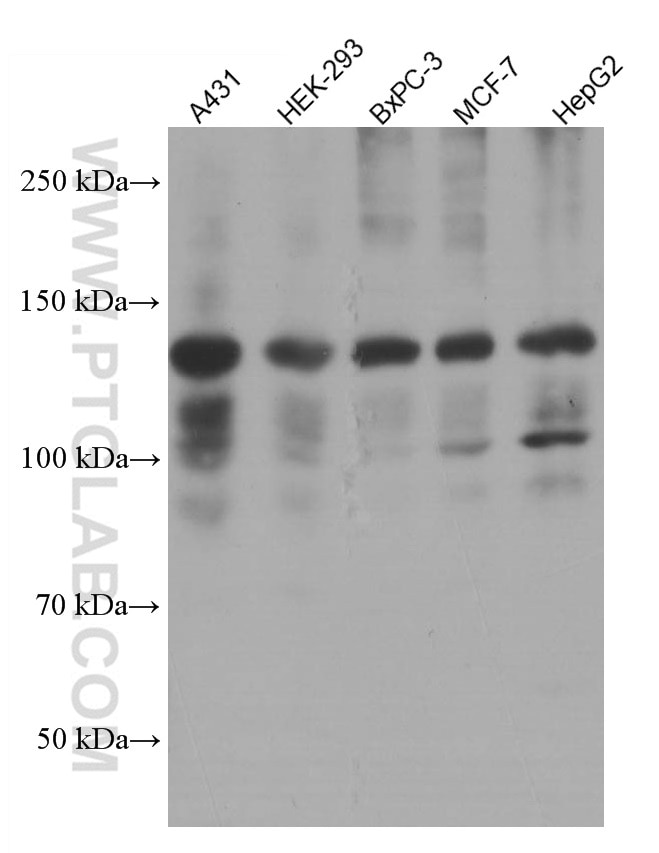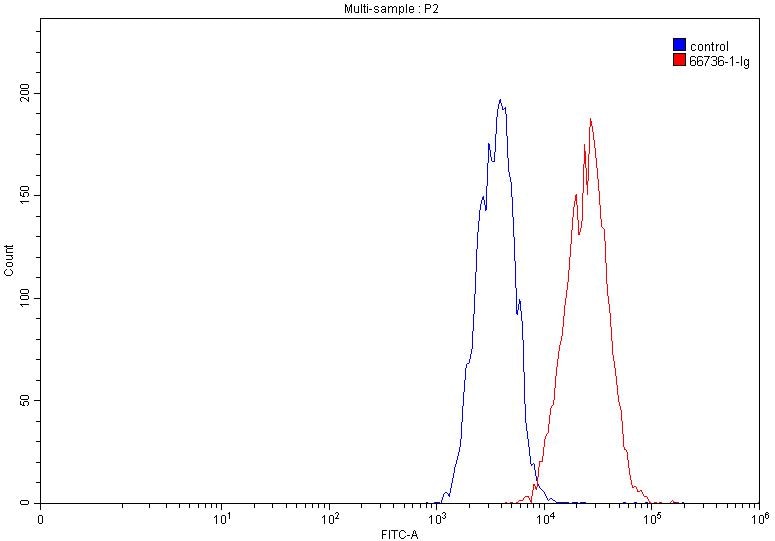- Featured Product
- KD/KO Validated
EPHA2 Monoklonaler Antikörper
EPHA2 Monoklonal Antikörper für FC, WB, ELISA
Wirt / Isotyp
Maus / IgG1
Getestete Reaktivität
human und mehr (1)
Anwendung
WB, FC, ELISA
Konjugation
Unkonjugiert
CloneNo.
1A9C3
Kat-Nr. : 66736-1-Ig
Synonyme
Galerie der Validierungsdaten
Geprüfte Anwendungen
| Erfolgreiche Detektion in WB | A431-Zellen, BxPC-3-Zellen, HEK-293-Zellen, HepG2-Zellen, MCF-7-Zellen |
| Erfolgreiche Detektion in FC | HeLa-Zellen |
Empfohlene Verdünnung
| Anwendung | Verdünnung |
|---|---|
| Western Blot (WB) | WB : 1:5000-1:50000 |
| Durchflusszytometrie (FC) | FC : 1:10-1:100 |
| It is recommended that this reagent should be titrated in each testing system to obtain optimal results. | |
| Sample-dependent, check data in validation data gallery | |
Veröffentlichte Anwendungen
| KD/KO | See 3 publications below |
| WB | See 6 publications below |
Produktinformation
66736-1-Ig bindet in WB, FC, ELISA EPHA2 und zeigt Reaktivität mit human
| Getestete Reaktivität | human |
| In Publikationen genannte Reaktivität | human, Maus |
| Wirt / Isotyp | Maus / IgG1 |
| Klonalität | Monoklonal |
| Typ | Antikörper |
| Immunogen | EPHA2 fusion protein Ag22566 |
| Vollständiger Name | EPH receptor A2 |
| Berechnetes Molekulargewicht | 976 aa, 108 kDa |
| Beobachtetes Molekulargewicht | 130 kDa |
| GenBank-Zugangsnummer | BC037166 |
| Gene symbol | EPHA2 |
| Gene ID (NCBI) | 1969 |
| Konjugation | Unkonjugiert |
| Form | Liquid |
| Reinigungsmethode | Protein-G-Reinigung |
| Lagerungspuffer | PBS mit 0.02% Natriumazid und 50% Glycerin pH 7.3. |
| Lagerungsbedingungen | Bei -20°C lagern. Nach dem Versand ein Jahr lang stabil Aliquotieren ist bei -20oC Lagerung nicht notwendig. 20ul Größen enthalten 0,1% BSA. |
Protokolle
| Produktspezifische Protokolle | |
|---|---|
| WB protocol for EPHA2 antibody 66736-1-Ig | Protokoll herunterladen |
| Standard-Protokolle | |
|---|---|
| Klicken Sie hier, um unsere Standardprotokolle anzuzeigen |
Publikationen
| Species | Application | Title |
|---|---|---|
Mol Ther Nucleic Acids EFNA4 promotes cell proliferation and tumor metastasis in hepatocellular carcinoma through a PIK3R2/GSK3β/β-catenin positive feedback loop. | ||
J Oncol EphA2 Promotes the Development of Cervical Cancer through the CXCL11/PD-L1 Pathway
| ||
J Alzheimers Dis Metabolic Reprogramming of Microglia Enhances Proinflammatory Cytokine Release through EphA2/p38 MAPK Pathway in Alzheimer's Disease
| ||
Chem Biol Interact 2-Methoxy-5((3,4,5-trimethosyphenyl)seleninyl) phenol (SQ) inhibits cancer cell metastasis behavior of TNBC via suppressing EMT and VEGF. | ||
Arch Biochem Biophys EphA2 inhibits SRA01/04 cells apoptosis by suppressing autophagy via activating PI3K/Akt/mTOR pathway.
|



